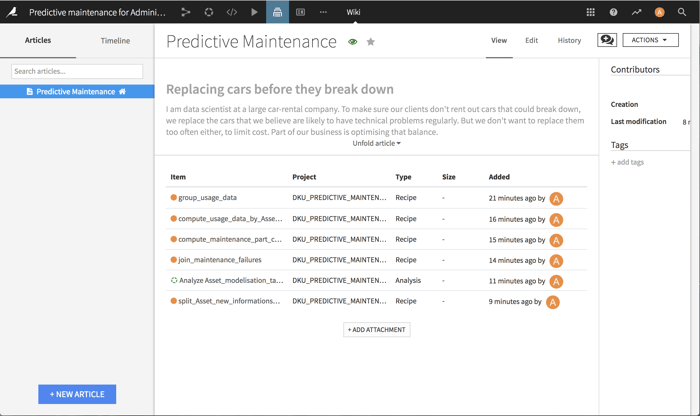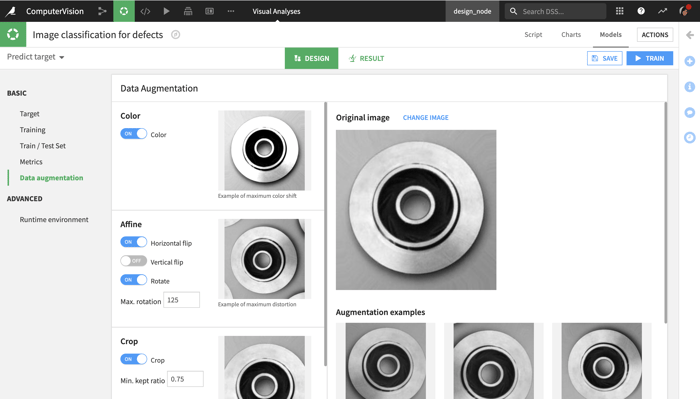Whether you're exploring a handful or hundreds of data science use cases, the application of data science across the company can seem nearly endless. Let’s explore some of the most common data science use cases and how they can benefit businesses.
Data Science Use Case #1: Predictive Modeling
Companies today have troves of data. They often want to understand how to get the most out of that data to respond to what comes next. Predictive modeling is just that — it involves using that historical data to make predictions about future events. This can be used for various applications, from predictive maintenance schedules in manufacturing to predicting customer behavior or forecasting sales.
Data science use cases focused on predictive modeling can help businesses make better decisions. Ultimately, they're empowered with a more accurate understanding of what is likely to happen in the future.
 A collaborative wiki in a predictive maintenance project in Dataiku.
A collaborative wiki in a predictive maintenance project in Dataiku.
Data Science Use Case #2: NLP
NLP is a widely used data science use case that can include the process of analyzing, understanding, and generating human language. This can be used for a variety of applications, such as sentiment analysis, chatbots, and text classification. NLP can empower businesses to quickly understand vast amounts of language inputs, such as better identifying patterns and trends in large amounts of customer feedback, or categorizing and tagging data from huge document repositories.
NLP can also apply to audio forms of language, for example automatically-generated text for videos to quickly help with accessibility or translation. There are many subcategories and applications of NLP, which continues to grow as one of the hottest topics of AI.
Data Science Use Case #3: Image Analysis and Computer Vision
Another application of data science is image and video analysis. This type of data science use case can help businesses improve their operations. It does so by providing them with a better understanding of what is happening in their environment.
Computer vision is the latest deep learning technology when it comes to image analysis and image recognition. It involves the development of algorithms and models to extract information and insights from visual data.
Examples include recognizing objects, detecting patterns, and tracking changes over time. Computer vision applications include object detection, such as detecting manufacturing defects or autonomous stores, or with edge deployments. On the other hand, it can also be used for activities like facial recognition or police surveillance.
 Visual computer vision capabilities in Dataiku.
Visual computer vision capabilities in Dataiku.
Data Science Use Case #4: Anomaly Detection
Anomaly detection is among the popular data science use cases. Anomaly detection involves identifying unusual patterns or deviations from normal behavior in the data. Quickly identifying these patterns can be especially useful in proactive risk mitigation — from identifying fraud to detecting equipment failures. Anomaly detection can help businesses identify potential problems before they become major issues.
Data Science Use Case #5: Recommendation Systems
Recommendation systems use user behavior data to make personalized recommendations. Companies can use historical data and purchasing patterns to recommend similar products to customers that they’re likely to enjoy.
You can also think about recommending content that users are likely to engage in. This will help to increase marketing efficiency or create personalized targeting for ad campaigns. Overall, recommendation systems can help businesses increase engagement and revenue.
Finding the Right Data Science Use Cases for Your Company
These are just some of the top applications of data science. As you can see, there are many ways ML use cases can benefit business outcomes. Examples include using data science to optimize your supply chain, improve your marketing campaigns, or develop new products and services. The key is to identify the specific business problem or opportunity and find the right data science approach to solve it.
Dataiku’s collaborative data workflows make it easy to tackle data science use cases across the organization. Watch the demo below to learn how Dataiku can help you embed analytics and AI in all processes to become truly data driven.




